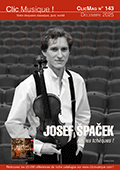 L'organiste, compositeur, improvisateur, pédagogue italien Marco Enrico Bossi (1861-1925) naquit l'année de l'unification de l'Italie, dans une famille de musiciens et reçut sa formation musicale au Liceo Musicale de Bologne puis au Conservatoire de Milan, où il eut pour professeurs Sangalli (piano 1820-1892), Ponchielli (composition 1834-1886) et Fumagalli (orgue 1837-1908). Bossi ne termina jamais ses études d'orgue, malgré des années d'études avec Fumagalli, en opposition à la pratique italienne opératique de l'orgue contemporaine. Au contraire, il parcourut l'Europe, l'Amérique, effectua de nombreuses tournées internationales de récitals d'orgue, nouant des liens avec des collègues tels que Joseph Bonnet, Marcel Dupré, Alexandre Guilmant. En 1890, il devint professeur d'orgue et de composition à Naples et à Bologne, puis directeur des conservatoires de Venise (1895-1901), de Bologne (1902-1911) et de Rome (1916-1923), avant d’être nommé en 1897 à la Commissione reale per l'arte musicale. Ce qui lui permit d’exercer une longue et profonde influence sur des compositeurs comme Ghedini ou Malipiero. Tout au long de sa vie, Bossi connut un succès considérable en tant que compositeur de plus de 150 œuvres pour différents genres : orchestre, cinq opéras, oratorios, musique chorale et de chambre, ainsi que des pièces pour piano et orgue. Il mourut inopinément au milieu de l'Atlantique alors qu'il rentrait des États-Unis le 20 février 1925. Sans doute son adhésion au parti fasciste en 1921 ruina dans l’instant la renommée de son œuvre. On connait déjà ses deux trios (Hungaroton HCD32293 et Brilliant Classics 95581). Les pièces rassemblées ici illustrent le talent mélodique de Bossi, et, autour des deux sonates pour violon et piano de 1893 et 1899, son sens de la forme hérité, entre autres, de César Franck. Roberto Noferini et Giulio Giurato, disciple loué de Jörg Demus, donnent le meilleur d’eux-mêmes pour valoriser ces compositions à découvrir. (Jacques-Philippe Saint-Gerand)  In spite of the predominance of the opera in Italy during the nineteenth century, chamber music and symphonic music had never died out in the musical world. The “father of the opera” had a mastery of instrumental effects and a command of formal balance that made it possible for him to nourish his music with instrumental inspiration coming from chamber music. And the succession of Rossini, Donizetti, Bellini and Verdi, side by side with the new generations of Ponchielli, Catalani, Mancinelli, down to Puccini, Perosi and Mascagni, created the preconditions for the birth and development of the chamber-music genre. This was strengthened also by some chamber-music and vocal influences that had even antagonised the domination of belcanto and operatic singing. Though never actually becoming an attention-seeking attitude, creativeness, a majestic jargon that appeared in many composers ranging from Corelli to Paganini, from Scarlatti to Clementi and many others, became such a noble, brilliant language as to stand out as an original, lofty expression in the crowded maelstrom of operatic theatre. As admirable examples of this we can mention the quartets of Cherubini and Donizetti, that were splendidly assimilated by Bazzini, reaching the original examples of the contributions of Sgambati and Martucci, which appeared a few decades before the creative works of Marco Enrico Bossi. Giulio Giurato and Roberto Noferini conclude with this production the complete publication of Marco Enrico Bossi's chamber music (Tactus tc 822704, 822606, 822707).
 |
